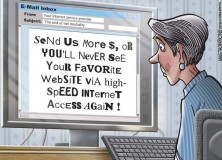Over the last couple of years, I occasionally posted opinions on the argument over Net Neutrality. I urged people to contact their legislators to continue fighting the large corporations desire to see it end.
Though there was a grassroots campaign to maintain Net Neutrality, it didn’t garner the overwhelming voice it required.
The net neutrality rules, approved by the FCC in 2015, were intended to keep the internet open and fair. Internet service providers like Comcast and Verizon were explicitly prohibited from speeding up or slowing down traffic from specific websites and apps.
Under the approved proposal, the FCC would do away with rules barring internet providers from blocking or slowing down access to online content. The FCC would also eliminate a rule barring providers from prioritizing their own content.
Ajit Pai, appointed to run the FCC by President Trump, has been a longtime critic of the net neutrality rules. Last month, he pitched his repeal proposal as a way stop the federal government from “micromanaging the internet.”
In a 3-2 vote, the FCC just ended Net Neutrality.
Most people aren’t interested in understanding the importance of Net Neutrality, or the result of having it come to an end.
They will.
Net Neutrality meant every Internet Service Provider (ISP) had to provide the same speed of access to every website (and apps) for all users. They could not block websites, or slow down access to certain websites, as they wanted.
Now, that restriction has been removed, meaning your favorite websites may come to a crawl, because the ISP will want you to access their own websites that they will make available at lightning speed.
The Internet may become the new form of a cable company, with ISPs offering “tiers” of access to websites.
Comcast, one of the largest ISPs, might offer subscribers plans based on the websites their corporation controls, with increasing fees for same speed access to those they don’t.
Want high speed to all Comcast websites, such as everything associated with NBC? $10/mo.
The same speed for the rest of the Internet? $100/mo.
They will also be able to charge other companies a fee, if they want their websites included in a “cheap” plan.
Netflix has been used as an example of a possible victim. Netflix could be charged millions of dollars by every ISP to maintain high speed access for users.
If they don’t pay, they could have their streaming and download speeds reduced to a crawl. In this day and age, people aren’t going to wait for portions of a movie or television show to “buffer” before playing short segments and then buffering again.
Google, which runs a marketplace where people and small companies sell items, could easily afford the costs of doing business, while a website like Etsy.com, could not.
Start-up companies that may develop the next advancement of the Internet in ways not even imagined, or provide an advancement in technology through the Internet, will never get off the ground. They will never be able to afford the cost of high speed access for visitors to their site, needed during start-up.
The issue may ultimately end up being decided in court. Congress can also choose to pursue a legislative solution.
A coalition of net neutrality advocacy groups is now shifting to petitioning Congress to overturn the FCC vote. The Internet Association said it’s also weighing legal options.
“While the fight to preserve net neutrality is going to be longer than we had hoped. This is far from over,” Alexis Ohanian and Steve Huffman, the cofounders of Reddit, wrote on Thursday.
Our only hope is that the expected lawsuits will delay the loss of Net Neutrality long enough for a new President to appoint a new FCC Chairman, who wasn’t a lawyer for Verizon.
Disclaimer: On January 4, 2016, the owner of WestEastonPA.com began serving on the West Easton Council following an election. Postings and all content found on this website are the opinions of Matthew A. Dees and may not necessarily represent the opinion of the governing body for The Borough of West Easton.







